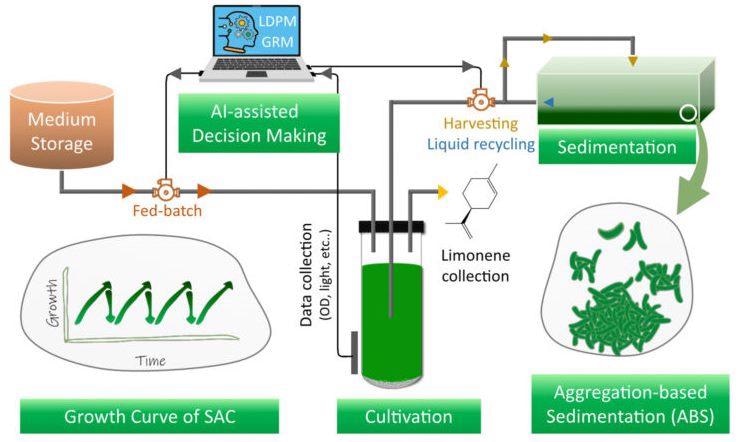Researchers at Texas A&M AgriLife are using artificial intelligence (AI) to set a new world record for creating algae as a dependable, economic source for biofuel that can be employed as an alternative fuel source for jet aircraft and other transportation requirements.
 Texas A&M AgriLife Research scientists are using artificial intelligence for producing algae as a reliable, economic source for biofuel. This illustration depicts the integration of machine learning-informed semi-continuous algal cultivation (SAC) and aggregation-based sedimentation (ABS) for biofuel production. Image Credit: Texas A&M AgriLife Research
Texas A&M AgriLife Research scientists are using artificial intelligence for producing algae as a reliable, economic source for biofuel. This illustration depicts the integration of machine learning-informed semi-continuous algal cultivation (SAC) and aggregation-based sedimentation (ABS) for biofuel production. Image Credit: Texas A&M AgriLife Research
Joshua Yuan, Ph.D., AgriLife Research scientist, professor and chair of Synthetic Biology and Renewable Products in the Texas A&M College of Agriculture and Life Sciences Department of Plant Pathology and Microbiology, is directing the study.
The team’s findings have been reported in the January issue of Nature Communications. Ongoing research is sponsored by the U.S. Department of Energy Fossil Energy Office. The study is also being financially supported by a gift from Dr. John ’90 and Sally ’92 Hood, who recently met with Yuan to talk about his biofuels research program. The gift is controlled by the Texas A&M Foundation.
The project team includes Bin Long, a graduate student from the Department of Plant Pathology and Microbiology; Bart Fischer, Ph.D., co-director of the Texas A&M Agricultural and Food Policy Center and Texas A&M Department of Agricultural Economics; Henry Bryant, Ph.D., Department of Agricultural Economics; and Yining Zeng, Ph.D., staff scientist with the U.S. Department of Energy National Renewable Energy Laboratory.
Solving the Algae Limitations as a Biofuel
The commercialization of algal biofuel has been hindered by the relatively low yield and high harvesting cost. The limited light penetration and poor cultivation dynamics both contributed to the low yield.
Joshua Yuan, Ph.D., AgriLife Research Scientist and Professor and Chair of Synthetic Biology and Renewable Products, Department of Plant Pathology and Microbiology, College of Agriculture and Life Sciences, Texas A&M University
Surpassing these challenges could allow sustainable algal biofuels to decrease carbon emissions, alleviate climate change, ease petroleum dependency and change the bioeconomy, Yuan said.
Yuan has earlier been successful at discovering techniques to turn corn stubble, grasses and mesquite into biodegradable lightweight materials and bioplastics. His newest project employs a patented artificial intelligence advanced learning model to estimate algae light penetration, growth and ideal density.
The prediction model enables the repeated harvest of artificial algae using hydroponics to maintain the fast growth at the ideal density to facilitate the best light availability.
The technique Yuan and team effectively accomplished in an outdoor experiment is 43.3 g/m2 per day of biomass productivity, which would be a world record. The most recent DOE target range is 25 g/m2 per day.
Algae can be used as an alternative energy source for many industries, including biofuel and as jet fuel. Algae is a good alternative fuel source for this industry. It’s an alternate feedstock for bioethanol refinery without the need for pretreatment. It’s lower cost than coal or natural gas. It also provides for a more efficient way of carbon capture and utilization.
Joshua Yuan, Ph.D., AgriLife Research Scientist and Professor and Chair of Synthetic Biology and Renewable Products, Department of Plant Pathology and Microbiology, College of Agriculture and Life Sciences, Texas A&M University
According to Yuan, algae can also be used as a source of animal feed. AgriLife Research has earlier explored algae as a source of livestock protein.
Algae as a Renewable Energy
Algae biofuel is said to be one of the decisive solutions for renewable energy, but its commercialization is delayed by growth limitations as a result of high harvest costs and mutual shading.
“We overcome these challenges by advancing machine learning to inform the design of a semi-continuous algal cultivation (SAC) to sustain optimal cell growth and minimize mutual shading,” he said.
Yuan said he is using an aggregation-based sedimentation strategy engineered to realize low-cost biomass harvesting and cost-effective SAC.
The aggregation-based sedimentation is achieved by engineering a fast-growing blue-green algae strain, Synechococcus elongatus UTEX2973, to produce limonene, which increases cyanobacterial cell surface hydrophobicity and enables efficient cell aggregation and sedimentation.
Joshua Yuan, Ph.D., AgriLife Research Scientist and Professor and Chair of Synthetic Biology and Renewable Products, Department of Plant Pathology and Microbiology, College of Agriculture and Life Sciences, Texas A&M University
Making Algae Economical Energy
Expanding the SAC with an outdoor pond system accomplishes a biomass production of 43.3 g/m2 per day, decreasing the minimum biomass selling price down to around $281 per ton, according to the journal article.
In comparison, the typical economical feedstock for biomass in ethanol is corn, which is at present around $6 per bushel or $260 per ton. However, Yuan’s approach does not require expensive pre-treatment prior to fermentation. On the other hand, corn has to be ground and the mash must be cooked prior to fermentation.
Algae as a renewable fuel source was a hot topic a decade ago, As a result, there’s a lot of skepticism. I was even skeptical. However, the work that Joshua is doing is incredibly innovative. We were excited to partner on this project. At the productivity levels they obtain—and given the low-cost harvest that the strain allows—it shows a lot of promise.
Bart Fischer, Ph.D., Co-Director of Agricultural and Food Policy Center, Department of Agricultural Economics, Texas A&M University
Yuan said, regardless of substantial potential and widespread efforts, the commercialization of algal biofuel has been delayed by poor cultivation dynamics, partial sunlight penetration, comparatively low yield, and the absence of economical industrial harvest techniques.
“This technology is proven to be affordable and help propel algae as a true alternative form of energy,” he said.
Journal Reference:
Long, B., et al. (2022) Machine learning-informed and synthetic biology-enabled semi-continuous algal cultivation to unleash renewable fuel productivity. Nature Communications. doi.org/10.1038/s41467-021-27665-y.